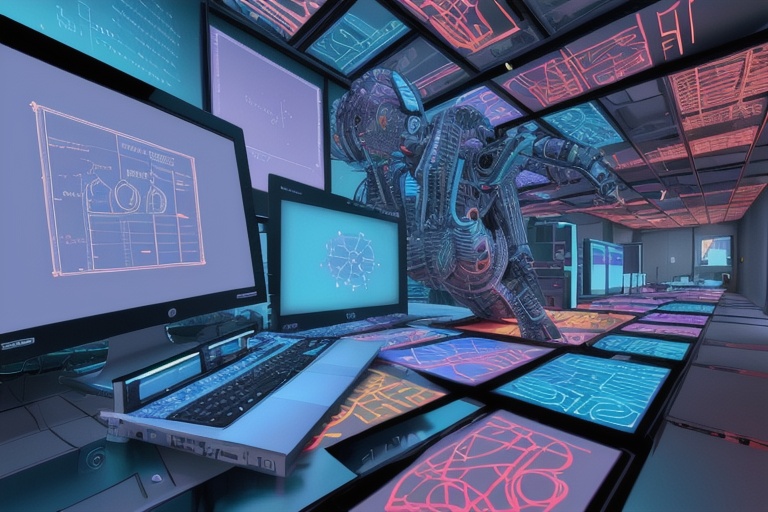Welcome to our exploration into the dynamic and transformative world of artificial intelligence and machine learning. As we delve into the fascinating journey of artificial intelligence, we'll uncover the history that spans from its early conceptual origins to the trailblazing technological breakthroughs we witness today. This article offers a comprehensive look at the visionary figures, pivotal milestones, and innovative developments that have come to define AI's evolution. As we navigate through the advancements and the profound impact AI is poised to have across various sectors, we also consider the essential ethical framework that must guide this journey forward. Whether you are newly curious or deeply invested in these technologies, join us on an enlightening voyage through the past, present, and future of artificial intelligence.
Welcome to our exploration into the dynamic and transformative world of artificial intelligence and machine learning. As we delve into the fascinating journey of artificial intelligence, we'll uncover the history that spans from its early conceptual origins to the trailblazing technological breakthroughs we witness today. This article offers a comprehensive look at the visionary figures, pivotal milestones, and innovative developments that have come to define AI's evolution. As we navigate through the advancements and the profound impact AI is poised to have across various sectors, we also consider the essential ethical framework that must guide this journey forward. Whether you are newly curious or deeply invested in these technologies, join us on an enlightening voyage through the past, present, and future of artificial intelligence.
The Birth of a New Science
The story of artificial intelligence begins not in a laboratory, but in the realm of science fiction. Imaginations have long been captured by the idea of machines that can think and act like humans. This early curiosity set the stage for the birth of a new scientific field—one where fiction would give way to tangible research and development.
The Turing Test and Early Milestones
Alan Turing, a renowned mathematician, played a pivotal role in the transition from theoretical concepts to practical experiments. His pioneering 1950 paper, "Computing Machinery and Intelligence," introduced what is now known as the Turing Test—a criterion to determine a machine's ability to exhibit human-like intelligence. The test remains a topic of discussion and debate, reflecting the challenges and aspirations of AI pioneers who followed Turing's lead.
Periods of Growth and "AI Winters"
The evolution of AI has been marked by periods of intense growth and development, punctuated by the so-called "AI winters"—times when progress slowed, funding dried up, and skepticism prevailed. These cycles mirrored the evolving understanding of what artificial intelligence could achieve and the limitations that scientists faced. Despite these challenges, relentless research and innovation gradually led to breakthroughs that kept the dream alive.
Resurgence and Recent Advancements
In recent years, the field of AI has experienced a remarkable resurgence. This is largely due to advances in computing power, the availability of massive datasets, and the development of new machine learning techniques, especially deep learning. These innovations have shattered previous barriers, making it possible for AI to surpass human aptitude in certain tasks.
Revolutionizing Industries
Today, artificial intelligence is not just a subject of research; it's a practical tool revolutionizing industries across the board. From healthcare to finance, transportation to entertainment, AI's applications are seemingly limitless. Its integration into daily processes and decision-making is enhancing efficiency, accuracy, and personalization.
Navigating Ethical and Regulatory Considerations
As we celebrate AI's remarkable potential, we must also acknowledge the ethical implications and the necessity of responsible development. Ensuring AI systems are unbiased, transparent, and respectful of user privacy is paramount. Additionally, regulations are needed to oversee AI's integration into society to prevent misuse and protect public interests. As this technology continues to develop, these considerations will shape its role in our lives.
Looking to the Future
As artificial intelligence continues its relentless march forward, we must remain vigilant observers, enthusiastic learners, and thoughtful critics. The landscape of AI is one of constant evolution, where today's breakthroughs lay the groundwork for tomorrow's innovations. By embracing AI with a balanced perspective, we can harness its potential responsibly and ensure it serves the greater good.
Embracing the full scope of AI's history and its trajectory into the future offers valuable insights into how this technology will continue to shape our world. The importance of guiding AI development with ethical considerations and regulatory frameworks cannot be overstated. By doing so, we can steer this powerful force towards a future of innovation and progress that benefits all. Keep a watchful eye on artificial intelligence, for it has the ability to redefine our society and our lives in profound ways.
Information for this article was gathered from the following source.




